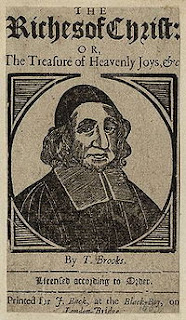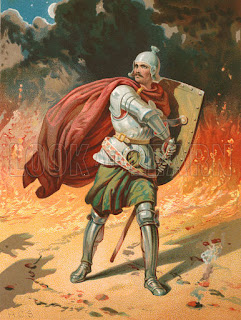A Month With the Puritans--Thomas Brooks--Part 1
I am continuing this series for the rest of the month of March. I have chosen to attempt to introduce you to a few of the Puritans that I have found stimulating to me over the last few years. Oddly enough very few Pentecostal preachers have discovered the rich depth of the Puritans. It is immediately clear when you begin to read their sermons and commentaries that these men were much given to the preaching of Scripture.
Having covered Thomas Shepard (Part 1, 2) and a series on the preaching of the Puritans (Part 1, 2, 3, 4), we now turn toward Thomas Brooks. Brooks was another accidental find for me. In the fall of 2006, I received a flyer in the mail advertising a book by Joel Beeke and Randall Pederson entitled Meet the Puritans. The book had close to nine-hundred pages and was being offered for $20. Since I like cheap books, I sent the card back in and received it.
While I had read some about the Puritans in the past, this is the one that sort of opened up the Puritans to me. I was reading through the reviews in the front of the book and found that Pastor Geoff Thomas from Wales had written the following about Thomas Brooks:
I was blessed in the first Puritan books I studied. They were readable, helpful, intensely practical, and fascinating. . . It confirmed I had entered a new world. The next practical help was Precious Remedies Against Satan’s Devices, a large green hardback published by Sovereign Grace Publishers in 1960. Years later it would become a series of sermons. . . Very recently I have been delighted with Thomas Brook’s book on personal devotion, The Secret Key to Heaven. . .
Thomas Brooks was born in 1608 and died in 1680. He went to Emmanuel College which was the same school that Thomas Hooker, John Cotton, and Thomas Shepard were educated. They would all depart and become known as the New England Puritans while Brooks would remain behind to pastor in London.
His trouble begins in 1662 with the fateful Act of Uniformity that attempted to place pressure on all of the Puritans who were attempting to coexist with the Church of England. Because of this he was forced from the pastorate in St. Margaret’s. From that point on he would be confined to smaller churches and congregations where he was invited to preach. Finally, he became the pastor of a congregation in Moorfields.
Alexander Grosart knew Brooks and was asked to preach his funeral. There are some points that Grosart brought out about him in the message that can serve as a leaping off point to get us acquainted with Brooks. Grosart’s words indicate to us that he was a man of stately character.
First, he was a man of good nature and temper. He was affable, courteous, and cheerful. Grosart noted that pride and moroseness are bad qualities for a minister to have in his life. Brooks strove to make sure that men saw God in his actions and that he wanted his life to draw men to God instead of push them away from Him.
Secondly, he was a man of great gravity. While there was a cheer about him, there was also a presence about him in which people knew that he was serving a serious call to a serious God. He was much loved but he also could be dreaded if there were dark sins in a person’s life. God had given him such a spirit with power that his “very frowns were darts” and his “reproofs were sharper than swords.” He hated to have a familiarity that caused a contempt for God.
He was a man who was greatly gifted with patience. He had the ability to suffer greatly and do it without complaint. His health became fragile in middle years of his life and he had to endure much suffering because of it. On way that he chose to bear it was in understanding that the pardon that God secured had the ability to make men forget their suffering and painful situations they had to endure in this life.
He was very devoted to Scripture and had a head full of theology that was practical and useful. It was preached very well to those who heard him. However, he was never satisfied with only preaching behind the pulpit. He printed as much as he preached because his goal was to imprint the truth of God’s word on every heart that heard him or read his works. He took great joy in his work. Grosart said that it was his meat and drink to labor in that great work, insomuch that under his weakness he would be often preaching of little sermons—as he called them—to those that came to visit him, even when by reason of his distemper they were hardly able to understand them.
As for his “little” sermons, Brooks managed to pull 58 sermons out of Hebrews 12:14. Those sermons are in a volume called “The Crown and Glory of Christianity.”
More tomorrow. . .
Thanks for reading. . .
Philip Harrelson
Having covered Thomas Shepard (Part 1, 2) and a series on the preaching of the Puritans (Part 1, 2, 3, 4), we now turn toward Thomas Brooks. Brooks was another accidental find for me. In the fall of 2006, I received a flyer in the mail advertising a book by Joel Beeke and Randall Pederson entitled Meet the Puritans. The book had close to nine-hundred pages and was being offered for $20. Since I like cheap books, I sent the card back in and received it.
While I had read some about the Puritans in the past, this is the one that sort of opened up the Puritans to me. I was reading through the reviews in the front of the book and found that Pastor Geoff Thomas from Wales had written the following about Thomas Brooks:
I was blessed in the first Puritan books I studied. They were readable, helpful, intensely practical, and fascinating. . . It confirmed I had entered a new world. The next practical help was Precious Remedies Against Satan’s Devices, a large green hardback published by Sovereign Grace Publishers in 1960. Years later it would become a series of sermons. . . Very recently I have been delighted with Thomas Brook’s book on personal devotion, The Secret Key to Heaven. . .
Thomas Brooks was born in 1608 and died in 1680. He went to Emmanuel College which was the same school that Thomas Hooker, John Cotton, and Thomas Shepard were educated. They would all depart and become known as the New England Puritans while Brooks would remain behind to pastor in London.
His trouble begins in 1662 with the fateful Act of Uniformity that attempted to place pressure on all of the Puritans who were attempting to coexist with the Church of England. Because of this he was forced from the pastorate in St. Margaret’s. From that point on he would be confined to smaller churches and congregations where he was invited to preach. Finally, he became the pastor of a congregation in Moorfields.
Alexander Grosart knew Brooks and was asked to preach his funeral. There are some points that Grosart brought out about him in the message that can serve as a leaping off point to get us acquainted with Brooks. Grosart’s words indicate to us that he was a man of stately character.
First, he was a man of good nature and temper. He was affable, courteous, and cheerful. Grosart noted that pride and moroseness are bad qualities for a minister to have in his life. Brooks strove to make sure that men saw God in his actions and that he wanted his life to draw men to God instead of push them away from Him.
Secondly, he was a man of great gravity. While there was a cheer about him, there was also a presence about him in which people knew that he was serving a serious call to a serious God. He was much loved but he also could be dreaded if there were dark sins in a person’s life. God had given him such a spirit with power that his “very frowns were darts” and his “reproofs were sharper than swords.” He hated to have a familiarity that caused a contempt for God.
He was a man who was greatly gifted with patience. He had the ability to suffer greatly and do it without complaint. His health became fragile in middle years of his life and he had to endure much suffering because of it. On way that he chose to bear it was in understanding that the pardon that God secured had the ability to make men forget their suffering and painful situations they had to endure in this life.
He was very devoted to Scripture and had a head full of theology that was practical and useful. It was preached very well to those who heard him. However, he was never satisfied with only preaching behind the pulpit. He printed as much as he preached because his goal was to imprint the truth of God’s word on every heart that heard him or read his works. He took great joy in his work. Grosart said that it was his meat and drink to labor in that great work, insomuch that under his weakness he would be often preaching of little sermons—as he called them—to those that came to visit him, even when by reason of his distemper they were hardly able to understand them.
As for his “little” sermons, Brooks managed to pull 58 sermons out of Hebrews 12:14. Those sermons are in a volume called “The Crown and Glory of Christianity.”
More tomorrow. . .
Thanks for reading. . .
Philip Harrelson





Comments